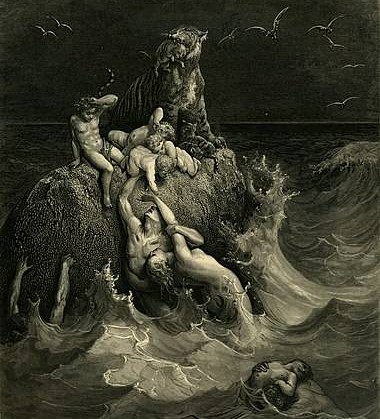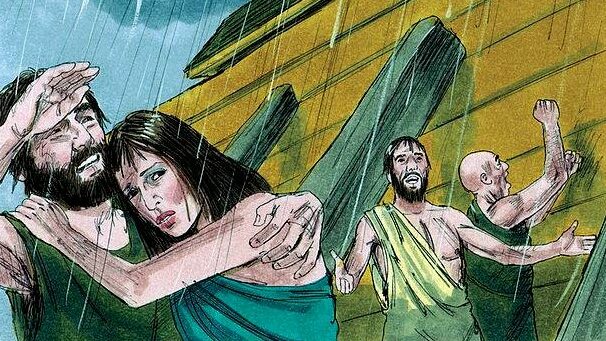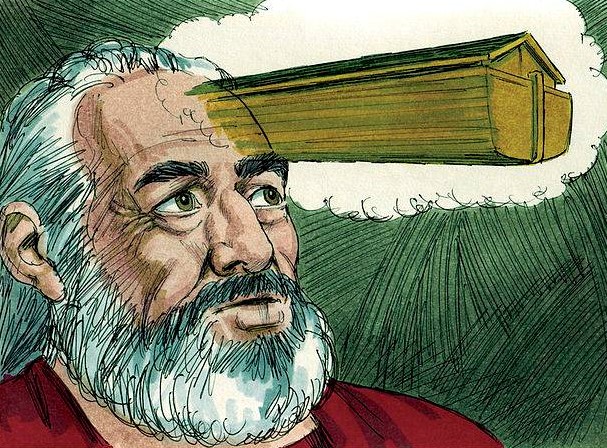The Miao, one of the official 56 minority peoples in China, have been there for a long time. Their origins are the subject of much discussion and speculation. Over the centuries the Han Chinese pushed them further south. Thus a prominent sub-group of Miao, called Hmong, spilled into Vietnam, Laos, and Thailand. During the Chinese Qing dynasty the Miao constantly battled with the Han Chinese. Then, during the 20th century the Hmong fought Vietnamese and Laotian forces in the Indo-China wars, so their history is integral to the histories of China, Vietnam, Laos and Thailand.
Hmong Flood Tradition
The Miao (or Hmong) kept an oral tradition of myths alive for thousands of years. One of their myths describes their origins from a great flood in the distant past. The different Miao sub-clans have different versions, but it typically goes like this one:
Who came to the bad disposition,
To send fire and burn the hill?
Who came to the bad disposition,
To send water and destroy the earth?
I who sing don’t know.E. T. C. Werner. 1922. Myths and Legends of China.
Zie did. Zie was of bad disposition,
Zie sent fire and burned the hill;
Thunder did. Thunder was of bad disposition,
Thunder sent water and destroyed the earth.
Why don’t you know?

Gustave Doré, Public domain, via Wikimedia Commons
Only a brother and sister escaped this flood. They did so by using a large bottle gourd as a boat. Because they were siblings, they were reluctant to marry, but eventually did. All peoples on earth as well as the Miao, came from them. Variations of this tradition can be found in “virtually every Southeast Asian ethnic group in Vietnam.”
Thai Flood Tradition
The Tai or Thai have a very similar Creation and Flood myth. It goes:
“The supreme god, Phu Ruthua (ผู้รู้ทั่ว) created the first man and woman. He named them Pu Sangkasa-Ya Sangkasi (Thai: ปู่สังกะสา-ย่าสังกะสี) or Grandfather Sangkasa and Grandmother Sangkasi. A thousand years passed, their descendants were wicked and crude as well as not interested in worshiping the supreme god. The god got angry and punished them with a great flood. Fortunately, some descendants survived because they fled into an enormous magical gourd…”
Siraporn Nathalang. 1996. An Analysis of the Creation Myths of the Tai Speaking Peoples.
The water eventually subsided, dry land appeared, and the survivors learned to cultivate. From them the Thai people come.
Chinese Flood Tradition
In the Chinese folktale Nüwa Mends the Heavens (Chinese: 女娲补天), Nüwa saved the world from destruction in a cataclysmic flood. A conflict in heaven between the gods unleashed the flood, but she plugged holes in the cosmos from which water was pouring onto the earth, and so stopped the flood.
Legends from peoples across Asia exist about a flood that had engulfed their ancestors. The stories consistently assert that only a few survived, from whom mankind then repopulated the world. Similar flood traditions can be found in cultures all over the world.

Gustave Doré, Public domain, via Wikimedia Commons
The ancient Hebrew writings of the Bible have a similar account, but this survives as a written record from the flood survivors rather than as an oral tradition. The written Biblical record claims that all peoples on earth today descend from that surviving family. Perhaps the Asian flood myths are dim memories of that same flood written down in the Bible.
We surveyed the Bible’s account of the creation of mankind; the temptation in paradise which brought about samsara and duhkha. We also unpacked the promise laid out as a riddle, which would direct human history.
The Bible then recounts the great flood, which people around the world remember in various ways, including those in Asia.
Noah’s Flood in the Bible
The Bible records a great flood from which Noah and his family were the only human survivors. Click here to read the complete account in the Bible. Memories of this event are preserved in many histories from different cultures, religions and peoples. Sedimentary rocks, only formed from a flood, cover the planet, thus we have physical evidence for this flood as well as anthropological evidence. But is there a lesson for us today that we can learn from this account?

Sweet Publishing, CC BY-SA 3.0, via Wikimedia Commons
Missing Mercy
When we wonder whether God and/or Karma judges corruption (sin), sometimes we might be tempted to think something like: “I am not too worried about it because I am hoping to get some mercy”. This account of Noah should cause a re-think. The flood destroyed that entire world (apart from Noah and his family). So was mercy available then? It was provided by the ark.

Sweet Publishing, CC BY-SA 3.0, via Wikimedia Commons
God in His Mercy, provided an ark that was available for anybody. Anyone could have entered that ark and received mercy and safety from the coming flood. But almost all people responded to the coming flood in disbelief. They mocked Noah, not believing that the flood would really come. So they perished. Yet all they needed was to have entered the ark and they would have escaped the Judgment.
Some living at that time probably thought that they could escape a flood by climbing to a higher hill, or by building a big raft. But they totally underestimated the size and power of the coming flood before which they were helpless. These ‘good ideas’ would not be sufficient for that judgment. They needed something that could protect them properly – the ark. While they followed the building of the ark it functioned as a sign of both coming Judgment and available Mercy. And in paying attention to the example of Noah it speaks today similarly. It reminds us that we obtain mercy through the provision that God has established, not by our own good ideas.
Receiving Mercy
So why did Noah find the Mercy of God? You will notice that the Bible repeats several times the phrase:
And Noah did all that the Lord commanded him.
We usually tend to do only what we understand, what we like, or what we agree with. God warned Noah of a coming flood and commanded him to build an ark on land. Noah must have had many questions in his mind. He could have reasoned that since he had built up much merit, perhaps he did not need to build the ark. But he did ‘all‘ that was commanded – not just what he understood, not what he was comfortable with, and not even what made sense to him. He left a great example for us to follow.
The Door for Salvation
The Bible also tells us that after Noah, his family, and the animals entered the ark that:
…Then the Lord shut him in.
Genesis 7:16b
God controlled and managed the One Door into the ark – not Noah. When the flood came and the waters rose, no amount of banging from people outside could move Noah to open the door. God controlled that one door. But at the same, time those inside could rest confident that since God controlled the door, therefore no wind or wave could force it open. They were safe in the door of God’s care and Mercy.
Since God never changes this still applies to us today. The Bible warns that there is another coming Judgment – and this one by fire. But Noah assures us that Mercy is always extended before Judgment comes. We should look for the ‘ark’ provided, which will cover our need and grant us Mercy.

Sweet Publishing, CC BY-SA 3.0, via Wikimedia Commons
To Sacrifice Once Again
The Bible also tells us:
20 Then Noah built an altar to the Lord and, taking some of all the clean animals and clean birds, he sacrificed burnt offerings on it.
Genesis 8:20
This fits the pattern of sacrifice we observed here. Noah offered an animal sacrifice to picture another sacrifice that he knew was coming, demonstrating his trust that God would do it.
The Bible says that just after this sacrifice that God ‘blessed Noah and his sons’ (Genesis 9:1) and made a covenant with Noah (Genesis 9:8-11), vowing to never again judge earth with a flood.
After the flood, the Bible records how the different races and languages arose, which we explore in our next article.
Rebirth – Through Law Or…
In the Bible, the Hebrews descending from Noah received two ways in which to obtain purity and cleansing. One way was through earning merit. The problem was that no one could earn sufficient merit. The other way was much more mysterious, and it involved a mystical death before achieving rebirth. Jesus also taught about this. He told a learned scholar in his day that:
“…no one can see the kingdom of God unless they are born again.”
John 3:3
The Bible describes both of these paths through people’s historical events. They were written down as examples for us so that we can learn from them. We see this in His call to Abraham, occurring after the dispersal of the human races, which the Creator God used to set in motion the events that dominate headlines today.